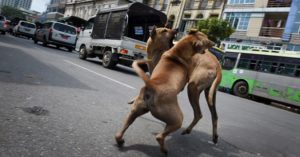You have no items in your cart. Want to get some nice things?
Go shopping The dogs of Kerala walk on walls like stalking gargoyles, eyes reddened by dust, yellow-cornered, ridden with disease. In the dirt, a puppy young-in-health runs between my legs; he bites playfully and his tooth snags in the fabric of my trousers. He is startled, afraid; he does not know to relax or be pulled deeper.
The dogs of Kerala walk on walls like stalking gargoyles, eyes reddened by dust, yellow-cornered, ridden with disease. In the dirt, a puppy young-in-health runs between my legs; he bites playfully and his tooth snags in the fabric of my trousers. He is startled, afraid; he does not know to relax or be pulled deeper.
There is howling outside the window – shrieking, fighting, snarling – the scene lit by a harvest moon, orange the color of a swami’s robes. The dogs wake me at half two with my alarm set for a quarter to five. I need to kindle the lantern, bring the offering, a drink for the guru. At the end we take what God has left behind. I drift back to sleep for a few precious hours.
Two astride the dogs trot the mazy paths fronting the Varkala cliffs. They run in circles going nowhere. Paw prints left behind in the early morning sand glisten in the rising sun. Tracks of paws washed away by the rising tide. We meditate on impermanence while men smoke and women work or talk.
The man next door screams in the night. He stamps when the dogs approach, curses. He is a loud man, filled with sea wind. The dogs see through his bluster, but run all the same. The howls return, like suffering. Perhaps they never leave, just subside beneath waves of exhaustion or bliss. The fisherman’s catch is poor again.
A dog pokes her head through the front gate. She steps in unsure, someone hisses, she looks, decides, turns and trundles away. There are cats too: three kittens appear for a few days, mewing and crying, skinny and lice-ridden, begging to be scratched and fed. One got into my room, twice, hid under the bed, out of reach my grasping hand. But a kitten can’t stop moving for long; a kitten can be waited out. The kittens disappear. If it’s the dogs, crushed by a spinning tyre, drowned in the deep ocean, I don’t know.
In the naming ceremony Guruji christens me swan. They are finicky creatures, swimming in circles. When they get too close to one another they erupt in screams and honks, flap their wings. They quickly forget and swim again. I hold anger in my hand like a hot coal, wounded fingers grasp fire to throw at the enemy.
Do the screaming dogs nurse resentment? Do the same dogs fight each night? Do the dogs call each other adversary, know their foes strengths and weaknesses? Do they hate? Animals don’t remember such things we are told: names of offenders, lists of grievances. Each day, each minute is new. I am not so sure.
The dogs of Kerala exist and eat what they can and multiply when they can. The dogs of Kerala howl at the moon and wind, while we lay sleepless, preparing to rise, waiting. Hanging on the edge of perilous knowledge.

About Erik Wennermark
Erik Wennermark writes various prose in Tokyo, Japan. His Falun Gong inspired novella "The True Story of Yu Fen" and short story collection "Evil Men" are available in ebook format. His nonfiction on topics as varied as the politics of Hong Kong independence, the death rattle of an Indian guru, and murderous Hmong, is likewise dispersed on the web on the web and beyond.
- Web |
- More Posts(2)




